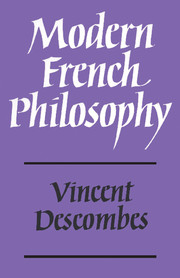Book contents
- Frontmatter
- Contents
- Foreword by Alan Montefiore
- Note on abbreviations and translation
- Introduction: Philosophy in France
- 1 The humanisation of nothingness (Kojève)
- 2 The human origin of truth (Merleau-Ponty)
- 3 Semiology
- 4 The critique of history (Foucault, Althusser)
- 5 Difference (Derrida, Deleuze)
- 6 The end of time (Deleuze, Klossowski, Lyotard)
- Index
2 - The human origin of truth (Merleau-Ponty)
Published online by Cambridge University Press: 05 June 2012
- Frontmatter
- Contents
- Foreword by Alan Montefiore
- Note on abbreviations and translation
- Introduction: Philosophy in France
- 1 The humanisation of nothingness (Kojève)
- 2 The human origin of truth (Merleau-Ponty)
- 3 Semiology
- 4 The critique of history (Foucault, Althusser)
- 5 Difference (Derrida, Deleuze)
- 6 The end of time (Deleuze, Klossowski, Lyotard)
- Index
Summary
Kojève explained to his listeners that the aim of philosophy was to account for the ‘fact of history’. He said that this question, stifled by the ‘monist ontology’ inherited from the Greeks, had been posed for the first time by Kant and Hegel. In Being and Nothingness, Sartre too assigns to metaphysics the task of answering the question, why is there history? But the only answer he could envisage was a kind of pantheistic myth in which he claimed not to believe. It is impossible, he explained, for nature to give rise to consciousness.
Merleau-Ponty points out that the opposition of subject and object, or in Sartrian language, of for-itself and in-itself, makes any understanding of the ‘fact of history’ (something much in demand) impossible. Once denaturised by virtue of the negative definition of freedom (‘to be free’ = ‘to be able to say no’), man is in opposition to things. Being and freedom are understood as antithetical. But in these conditions, historical action is not possible, for such action is distinguished from futile agitation by the fact that it leads to results, that it modifies the course of things, that it leaves behind it a work. And the possibility of historical work is excluded by the antithesis which confronts the stubborn identity of being with the freedom of nothingness.
- Type
- Chapter
- Information
- Modern French Philosophy , pp. 55 - 74Publisher: Cambridge University PressPrint publication year: 1981



